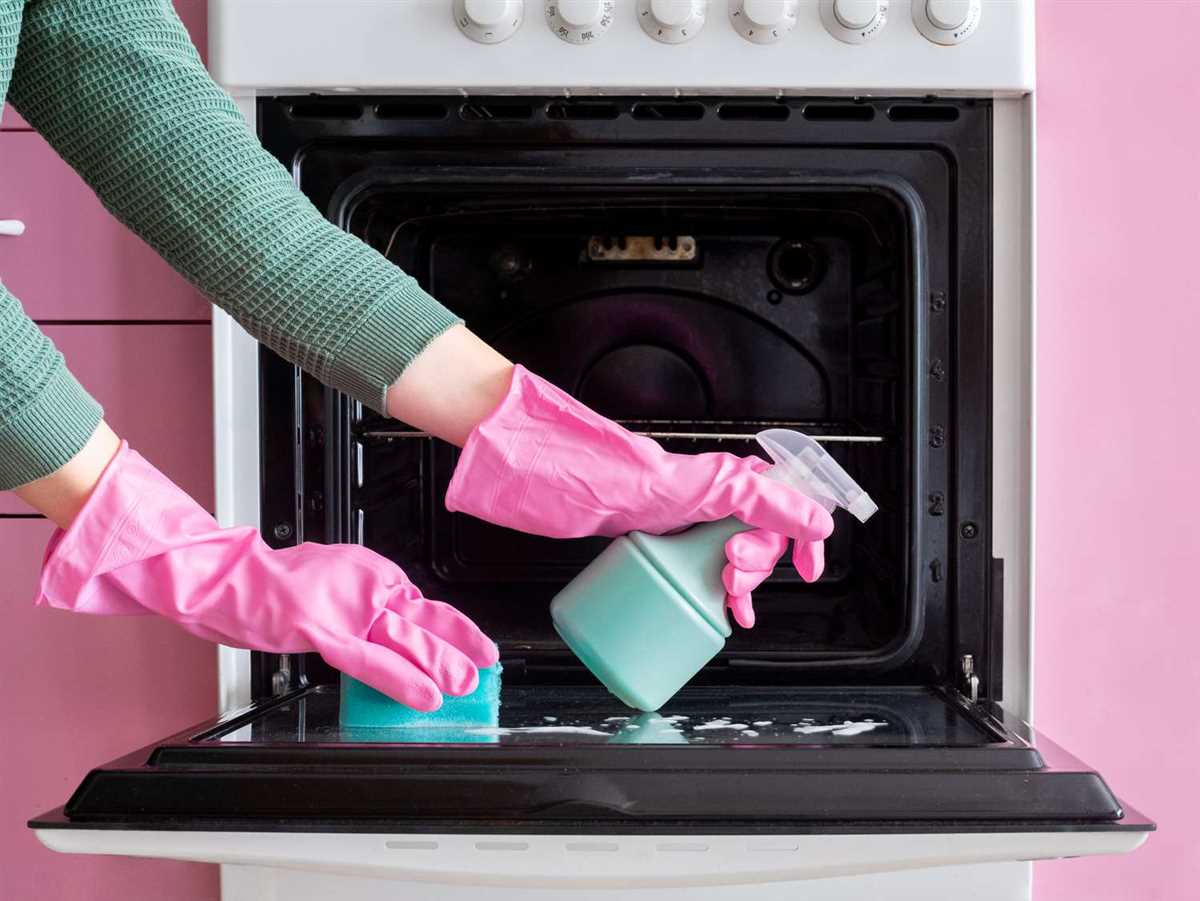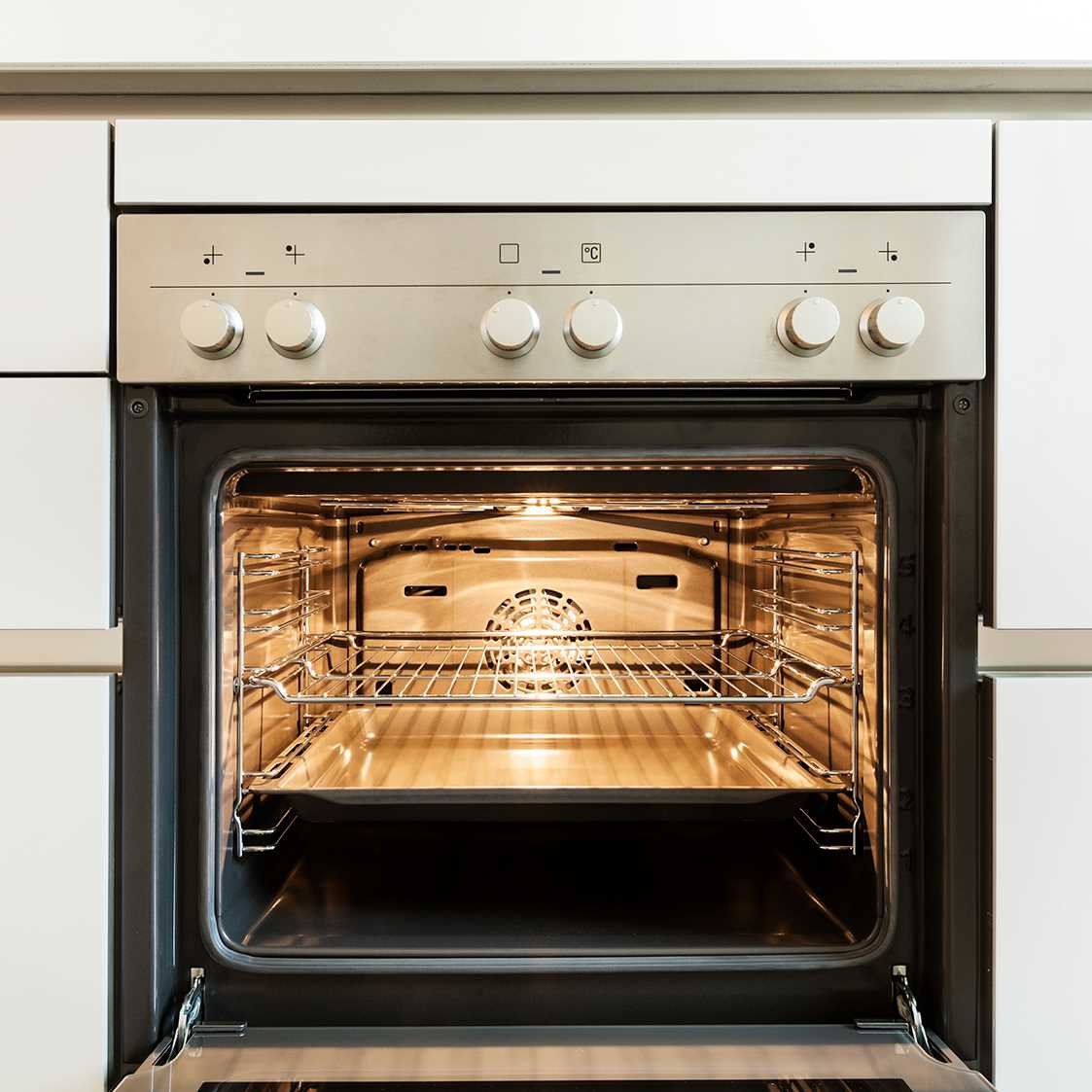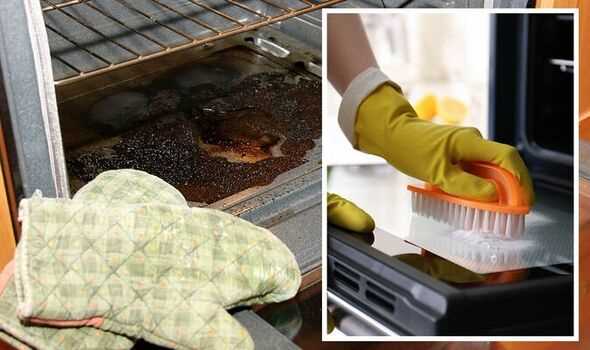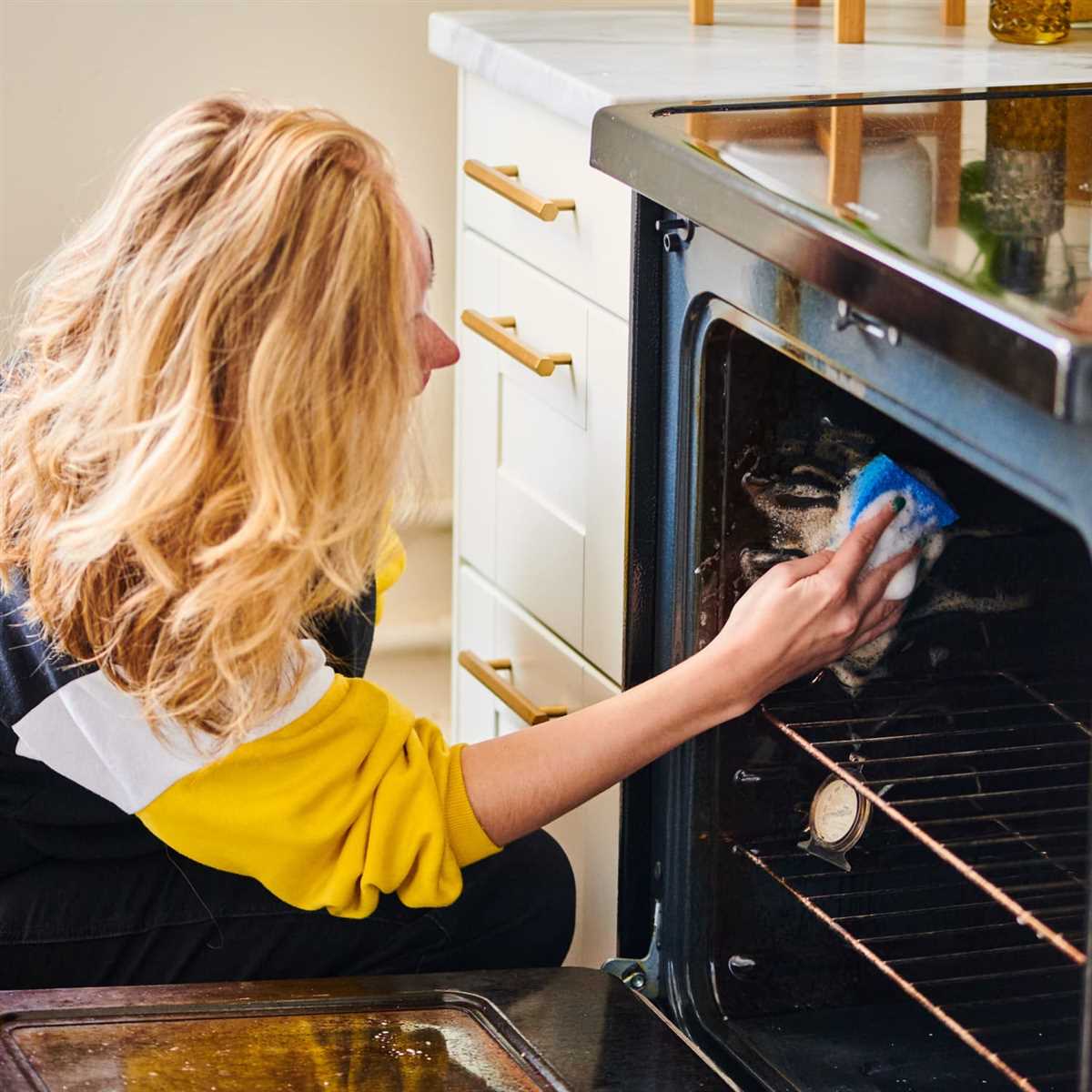




Keeping your oven clean is an important part of maintaining a healthy and efficient kitchen. Regular cleaning not only helps to prevent the build-up of grease and grime, but it also ensures that your food tastes as good as possible. But how often should you be cleaning your oven? We spoke to experts to get their advice and tips.
The general consensus among experts is that you should aim to clean your oven every three to six months, depending on how frequently you use it. If you’re someone who bakes or roasts on a regular basis, it’s best to clean your oven more frequently to prevent any build-up of food or grease. On the other hand, if you only use your oven occasionally, you can get away with cleaning it less often.
But don’t wait until your oven is covered in grime before you give it a clean. Regular maintenance is key to keeping your oven in tip-top shape. Promptly remove any spills or splatters with a damp cloth or sponge as soon as they occur. This will prevent them from hardening and becoming more difficult to remove later on.
When it comes to deep cleaning your oven, there are a few methods you can choose from. One popular approach is to use a mixture of baking soda and water to create a paste. Apply this paste to the interior of your oven, let it sit for a few hours, and then wipe it away with a damp cloth. Another option is to use a commercial oven cleaner, following the instructions on the packaging for best results. Whichever method you choose, be sure to take safety precautions and ventilate the area properly.
Understanding Oven Cleaning Basics
Keeping your oven clean is an important part of maintaining its performance and ensuring safe cooking. Regular cleaning not only helps to prevent the buildup of grease and food debris, but it also extends the lifespan of your oven and improves energy efficiency.
Why Clean Your Oven Regularly?
There are several reasons why you should make oven cleaning a regular part of your kitchen maintenance routine:
- Hygiene: Food spills and splatters can accumulate over time, creating a breeding ground for bacteria and odors.
- Fire Safety: Grease and food residue can potentially ignite and cause a fire hazard, especially if they come into contact with the heating element.
- Efficiency: A clean oven operates more efficiently, ensuring even heating and reducing cooking times.
- Longevity: Regular cleaning prevents the buildup of hardened grease and grime, which can damage the internal components of the oven over time.
How Often Should You Clean Your Oven?
The frequency of oven cleaning depends on the amount of use it gets. As a general rule, it is recommended to clean your oven every three to six months. However, if you frequently cook foods that produce a lot of grease or generate strong odors, you may need to clean your oven more often.
Methods of Oven Cleaning
There are several methods you can use to clean your oven, depending on your preferences and the severity of the dirt:
- Commercial Oven Cleaners: There are many oven cleaning products available on the market that are designed to break down grease and grime. Follow the instructions on the product carefully and take proper safety precautions.
- Natural Cleaning Solutions: You can make your own oven cleaner using common household ingredients such as baking soda, vinegar, and dish soap. These natural solutions are eco-friendly and chemical-free.
- Professional Oven Cleaning: If you prefer to leave the task to the experts, you can hire a professional oven cleaning service. They have specialized tools and techniques to effectively clean your oven.
Tips for Maintaining a Clean Oven
In addition to regular cleaning, here are some tips to help you keep your oven clean:
- Use Oven Liners: Place an oven liner or aluminum foil at the bottom of the oven to catch any spills or drips. This makes cleanup easier and prevents them from becoming stuck-on and hard to remove.
- Wipe Up Spills Promptly: To prevent the buildup of dirt and grime, wipe up any spills or splatters as soon as they occur. Use a damp cloth or sponge to remove the residue.
- Avoid Harsh Abrasives: When cleaning the interior of your oven, avoid using harsh abrasives or metal scrubbers that could scratch the surface. Opt for non-abrasive cleaners and soft cloths instead.
- Clean the Oven Racks: Remove the oven racks and clean them separately using warm soapy water or a dishwasher, if they are dishwasher-safe. This prevents them from staining or causing sticky residue.
By understanding the basics of oven cleaning and following these tips, you can ensure that your oven remains clean, efficient, and safe to use.
The Frequency of Oven Cleaning
Why is it important to clean your oven regularly?
Cleaning your oven is an important task that should not be neglected. Regular cleaning helps to maintain the efficiency of your oven and extends its lifespan. It also ensures that your food is prepared in a clean and hygienic environment, reducing the risk of cross-contamination.
How often should you clean your oven?
The frequency at which you should clean your oven depends on how often you use it and how heavily it is used. As a general guideline, it is recommended to clean your oven at least every three to six months. However, if you use your oven frequently or regularly cook greasy or sticky foods, you may need to clean it more often.
Signs that your oven needs cleaning
There are several signs that indicate it’s time to clean your oven:
- Visible grease buildup on the oven walls or door
- Unpleasant odours when the oven is in use
- Smoke or fumes coming out of the oven when cooking
- Uneven cooking or burning of food
Tips for cleaning your oven
Here are some tips to help you clean your oven effectively:
- Start by removing all racks and accessories from the oven.
- Mix a cleaning solution of equal parts water and baking soda to create a paste.
- Apply the paste to the interior of the oven, focusing on areas with grease or baked-on food.
- Leave the paste on for a few hours or overnight to allow it to work its magic.
- After the waiting period, use a damp cloth or sponge to wipe away the paste and loosened grime.
- Rinse the oven thoroughly with water to remove any remaining residue.
- Dry the oven with a clean, lint-free cloth before reinserting the racks and accessories.
Conclusion
Cleaning your oven regularly is essential for maintaining its efficiency and ensuring hygienic cooking conditions. By following the recommended frequency and using effective cleaning techniques, you can keep your oven in top shape and enjoy delicious meals without any worries.
Expert Tips for Oven Cleaning
1. Regular Cleaning Schedule
It is recommended to clean your oven at least once every three months to maintain its efficiency and prevent the buildup of grease and grime. However, if you use your oven frequently or notice any strong odors or smoke when cooking, you may need to clean it more often.
2. Use Natural Cleaning Solutions
Avoid using harsh chemicals and opt for natural cleaning solutions to protect yourself and the environment. Baking soda and vinegar are effective in removing grease and stains. Simply make a paste using baking soda and water, apply it to the interior of the oven, and let it sit for a few hours. Then, wipe it clean with a damp cloth or sponge.
3. Remove Oven Racks
Before cleaning, remove the oven racks to make it easier to access all areas of the oven. You can clean them separately by soaking them in warm soapy water or using a dishwasher if they are dishwasher-safe.
4. Addressing Stubborn Stains
If you encounter stubborn stains that are difficult to remove, sprinkle some baking soda over the affected area and add a few drops of vinegar. Allow the mixture to bubble for a few minutes, then scrub the stains with a non-abrasive brush or sponge.
5. Cleaning the Oven Door
Don’t forget to clean the oven door, both on the inside and outside. Use a mild detergent and a soft cloth to remove any grease or stains. Be cautious not to scratch the glass with abrasive materials.
6. Protecting the Heating Element
Avoid getting any cleaning solution or water on the heating element as it may cause damage. Use caution when cleaning around it, and if needed, cover it with aluminum foil to protect it from drips and spills.
7. Regular Oven Maintenance
In addition to cleaning, perform regular oven maintenance to keep it in good condition. Check the oven seals for any signs of wear or gaps, and replace them if necessary. Additionally, clean any built-in vents or filters to prevent odors and improve air circulation.
8. Safety Precautions
Always follow safety precautions when cleaning your oven. Ensure it is turned off and completely cool before starting the cleaning process. Use gloves and protective eyewear, and ensure proper ventilation in the kitchen by opening windows or turning on the exhaust fan.
By following these expert tips for oven cleaning, you can maintain a clean and odor-free oven while ensuring its longevity and efficiency.
DIY Methods vs. Professional Oven Cleaning
Different Approaches to Oven Cleaning
Cleaning your oven can be a challenging and time-consuming task, but it is essential to ensure a clean and safe cooking environment. There are two main approaches to oven cleaning: DIY methods and professional oven cleaning services. Each approach has its advantages and disadvantages, depending on your preferences and requirements.
DIY Methods

Cleaning your oven yourself using DIY methods is a cost-effective option that allows you to clean your oven at your convenience. There are various DIY methods that you can try, such as using baking soda and vinegar, commercial oven cleaners, or a mixture of dish soap and warm water. These methods often require scrubbing and scraping to remove stubborn grease and grime.
While DIY methods can be effective, they may not always deliver the same level of cleanliness as professional cleaning services. Additionally, DIY methods may take longer to achieve the desired results and require more effort on your part.
Professional Oven Cleaning
Hiring a professional oven cleaning service can provide a quick and efficient solution to your oven cleaning needs. Professional cleaners have the expertise, tools, and cleaning agents required to deep clean your oven effectively. They are trained to remove tough stains, grease buildup, and carbon deposits, leaving your oven sparkling clean.
Professional oven cleaning services can save you time and effort, as they handle all aspects of the cleaning process. They often use eco-friendly and non-toxic cleaning products, ensuring a safe environment for both you and your appliances. However, using professional cleaning services may come at a higher cost compared to DIY methods.
Which Option is Right for You?
The choice between DIY methods and professional oven cleaning ultimately depends on your personal preferences, available time, and budget. DIY methods may be suitable for minor cleaning tasks and regular maintenance, while professional cleaning services can provide a more thorough and efficient cleaning for heavily soiled ovens or if you prefer to leave the task to professionals.
Regardless of the approach you choose, it’s important to regularly clean your oven to maintain its performance, prevent damage, and ensure a clean cooking environment.
Mistakes to Avoid When Cleaning Your Oven

1. Neglecting regular cleaning
One common mistake many people make is neglecting regular cleaning of their oven. It’s important to clean your oven regularly to prevent the buildup of grease and food debris, which can lead to unpleasant odours and potentially even a fire hazard.
2. Using harsh chemical cleaners
Avoid using harsh chemical cleaners when cleaning your oven, as they can leave behind harmful residues and fumes. Instead, opt for natural cleaning solutions such as a mixture of baking soda and vinegar or lemon juice, which are effective in cutting through grease and grime.
3. Not removing oven racks and accessories
When cleaning your oven, don’t forget to remove the oven racks and other accessories such as drip pans and baking sheets. These items can accumulate a lot of grease and food debris, so it’s important to clean them separately to ensure a thorough cleaning of your oven.
4. Scrubbing too hard
While it’s important to scrub away stubborn stains and grease, be careful not to scrub too hard as this can damage the surface of your oven. Use a soft sponge or cloth and gentle pressure to avoid scratching or scraping the interior of your oven.
5. Ignoring the door and control panel
Many people forget to clean the oven door and control panel, focusing only on the interior. However, these areas can also accumulate dirt, grease, and fingerprints. Use a mild cleaning solution and a soft cloth to clean the door and control panel, ensuring a complete cleaning of your oven.
6. Not following the manufacturer’s instructions
It’s important to read and follow the manufacturer’s instructions when cleaning your oven. Different ovens may have different cleaning requirements, so make sure to consult the manual before proceeding. This will help you avoid damaging your oven and ensure an effective cleaning process.
7. Rushing the cleaning process

Cleaning your oven can be a time-consuming task, but it’s important not to rush the process. Take your time to thoroughly clean each part of your oven, including the interior, racks, and accessories. This will help ensure a clean and hygienic cooking environment.
8. Not wearing protective gloves
When using cleaning solutions or hot water to clean your oven, always wear protective gloves to protect your hands from chemicals and high temperatures. This will help prevent skin irritation or burns during the cleaning process.
9. Forgetting to clean the drip pan

The drip pan is an often overlooked part of the oven that catches drips and spills during cooking. Forgetting to clean the drip pan can lead to a buildup of grease and food debris, which can cause unpleasant odours and potentially affect the performance of your oven. Make sure to clean the drip pan regularly to maintain a clean and functional oven.
10. Not ventilating the kitchen
During and after the cleaning process, it’s important to ventilate your kitchen to prevent the buildup of fumes and odours. Open windows or turn on the exhaust fan to ensure proper ventilation, especially if you’re using cleaning solutions or chemicals during the process.
Avoiding these common mistakes when cleaning your oven will help ensure a safe and effective cleaning process, keeping your oven in optimal condition for cooking delicious meals.
FAQ
How often should I clean my oven?
It is recommended to clean your oven at least once every three months. However, if you use your oven frequently or notice a buildup of grease and grime, it may be necessary to clean it more often.
What is the best way to clean an oven?
The best way to clean an oven is to use a mixture of baking soda and water. Create a paste with the baking soda and water, spread it over the interior surfaces of the oven, and let it sit overnight. Then, use a damp cloth or sponge to wipe away the paste and any loosened dirt or debris.
Can I use oven cleaner to clean my oven?
Yes, you can use an oven cleaner to clean your oven. However, be sure to follow the manufacturer’s instructions and use the cleaner in a well-ventilated area. Oven cleaners are often harsh chemicals, so take proper precautions and avoid contact with your skin or eyes.
How do I remove burnt-on food or grease from my oven?
To remove burnt-on food or grease from your oven, you can use a commercial oven cleaner or a mixture of baking soda and water. Apply the cleaner or paste to the affected area, let it sit for a few minutes to loosen the grime, and then scrub with a sponge or cloth. Repeat as necessary until the burnt-on food or grease is removed.
Should I clean the oven racks separately?
Yes, it is recommended to clean the oven racks separately from the oven. You can soak the racks in a sink or tub filled with warm, soapy water and scrub them clean with a brush or sponge. Rinse them thoroughly and dry them before placing them back in the oven.
Are there any natural alternatives to commercial oven cleaners?
Yes, there are natural alternatives to commercial oven cleaners. As mentioned earlier, a mixture of baking soda and water can be used as a paste to clean the oven. Additionally, vinegar and lemon juice can be used to help remove grease and grime. These natural alternatives may require a bit more scrubbing, but they are generally safer for you and the environment.
Can I clean my oven with a self-cleaning feature more frequently?
The self-cleaning feature of an oven can be used more frequently than every three months. However, it is important to read the manufacturer’s instructions and follow their recommended cleaning schedule. Some ovens may not be designed for frequent self-cleaning and doing so could cause damage.
















